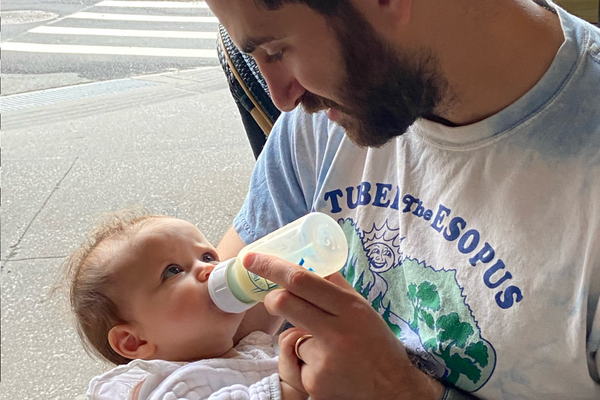There’s something about sending your child off to preschool for the first time that can really bring on all the feels. We don’t just mean for your little one—we’re talking about the parents, too. Not only is your child on an entirely new schedule, their days are now filled with socializing and learning in a way they’ve likely never experienced. So it’s understandable that all involved parties might feel a little stressed about the situation.
With that in mind, we tapped Michelle Tangeman, child and family therapist and founder of Michelle Tangeman Behavioral Health to shed some light on this massive shift from the perspective of both a child’s development as well as family routine. This mom of two has a lot to share around the preschool transition - from naps to socializing to separation anxiety, so that everyone in the family can be as prepared and empowered as possible to take on this change. Check out our interview, below:
Why is the transition to preschool a significant milestone for both children and parents?
For many families, this is the first time their child will spend an extended amount of time away from their parent(s). And it's often scarier for the parent than the child, assuming that the environment that the child is going to is safe and loving.
Preschool is a great opportunity for children to develop their social skills and build their independence and confidence, even though it might be scary.
What are some common emotions and behavior that children might exhibit during this transitional period?
This can vary from child to child, depending on their temperament. The most common issue parents see is separation anxiety, which depends on the child and how they navigate new situations. Some children will cry, cling to their primary caregiver or even throw a tantrum—while others might be completely fine.
Is there a way that parents can identify if their child is ready for preschool?
This is tricky because it really just depends on your motivation for sending your child to preschool. Is it because you need childcare? Is it because you’re motivated for your child to have social opportunities? I wouldn't necessarily say there are the things you should be looking for. It's more about your reasons and how you can help your child.
What can parents do at home to help prepare their child for the preschool environment?
Establishing a flexible routine at home is important.
There are many ways you can promote independence for your child. You can do this through activities like getting dressed, washing hands, putting away toys, cleaning up after meals, and scheduling playdates to promote social skills. Playdates are a great way to see how your child interacts with other children. This will also give you a baseline to compare how they might do in the classroom.
How important is it to establish a routine before the first day of preschool? Is there anything specific that should be added to your daily routine in preparation?
I always start with the mornings. Some children sleep in and others wake up early, so it's really about knowing your child’s routine, deciding how much time you need in the morning to get ready and working backwards from there. I would start ramping up this routine two-to-three weeks before your child starts preschool, as it might mean adjusting your child’s sleep schedule. Additionally, before they start school, I like to interview the preschool’s director and ask what a typical day looks like. I then take that information and try to replicate something similar in my home.
Do you have any tips for making a morning routine smoother for both parents and children?
Starting early and being consistent is important.
Decide what your routine is gonna look like and stick to it.
It doesn’t need to be rigid, but in the beginning, your child will respond better to a new environment when a routine is predictable. You can also use visual support by printing and laminating some cute pictures paired with a word to prepare your child for what’s to come. For example, the first thing we're going to do is eat breakfast. And the second thing we're going to do is brush your teeth. The third thing we're going to do is put our clothes on, get our backpack, and so forth. Visual aids can go a long way.
How crucial is the nap schedule for preschoolers? And how can parents manage that transition to a new sleep schedule?
There are different regulations for nap time, depending on your school and its geographic location. It’s not unheard of for children to drop their naps and sometimes that happens in that transition to preschool, but it depends on the child. Once again, talking with your preschool’s director can be a good idea. My best advice is to have a good solid relationship with the teachers and maintain open communication with them, the director, and any support staff that works directly with your child.
What do parents do if their child actually has difficulty napping at preschool?
It’s great to replicate your home situation at school as much as you can—although I know this can be difficult. Ask the preschool staff if your child can bring a comfort item with them that they like to sleep with, such as a stuffed animal or a blanket.
I’d also plan ahead. Roughly two weeks before school starts, I would adjust your child’s nap/bedtime schedule by 15-minute increments to more closely match the nap schedule at school and better fit your new routine.
What are some common social challenges that children face when they're starting preschool—and how can parents help?
The most common challenges you might encounter with preschoolers could include biting, toileting, frequent tantrums, and communication issues—because at this time, your kids are really learning to navigate their social world. If your child is in the right environment, and they feel supported, the staff are going to help them get over these humps. This once again comes back to you having open communication with the preschool staff.
What about separation anxiety?
It's often harder for the parent than it is for the child. Just remember that it's normal and there's nothing wrong with you, as a parent, or with your child. The best thing to do is not accommodate your child’s anxiety. This means you're not providing excessive comfort and you’re talking them through the daily routine (or removing them from the environment because of their discomfort).
As you say goodbye to your child, get down to their level for a hug and say “I love you and I’ll see you at pickup” and then walk away. It can take a child weeks or months to get past this hurdle. That said, initial separation anxiety should only last 10 minutes or less. If your child is constantly crying for 20-30 minutes, then it might be worth examining if the preschool is the right environment for them.
What should parents expect during the first few weeks of preschool, in terms of their child's adjustment and behavior?
Expect nothing and everything! Again, it really depends on your child's temperament. Your best indicator is how they do when you’re traveling or not home. That will give you a lot of information in terms of what you can expect.
What should parents do if they feel like their child is not adjusting well to preschool?
Listen very carefully to your child, but also collaborate with the staff and see what they're observing. I think a big challenge is to not only listen to what your child is saying, but also pay attention to the info you're hearing from the staff on campus.
Is there one piece of advice you would give parents who are anxious about this transition?
There's no right or wrong in terms of going to preschool or not, but there are a lot of benefits to sending your child to preschool. And I would focus on what those benefits are, and why that's important to you and your family.








































